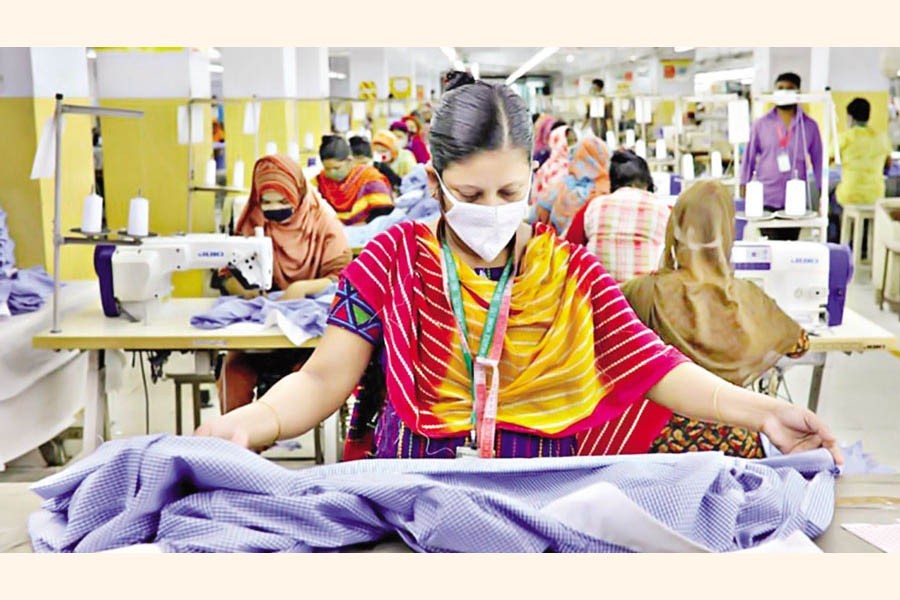
Published :
Updated :

With improved safety, compliance and Covid-recovery situation, Bangladesh has been a lucrative destination for global apparel buyers and retailers.
The local readymade garment industry has also enhanced its production base in the last one decade, especially after the Rana Plaza building collapse, luring the buyers to place more work orders.
Representatives of the global apparel buyers and retailers made the observation at the third 'Sustainable Apparel Forum' held at the International Convention City, Bashundhara in the capital on Tuesday.
Simultaneously, the 12th edition of Denim Expo kicked off at the same venue.
Speaking at the forum, Ziaur Rahman, regional head of Swedish retail giant H&M for Bangladesh, Pakistan and Ethiopia, said, "Bangladesh is the most important sourcing destination for our company."
Considering the geo-political situation, Bangladesh is in a very good position compared to other garment manufacturing countries - this is also doing well in terms of recovering from Covid fallout, he noted.
Explaining the reasons, Mr Rahman said that Bangladesh had many green factories that were well-ahead in maintaining sustainability - the thing that buyers prefer.
Bangladesh has also developed its ability to supply all kinds of garment items, he said.
Mr Rahman, however, warned that exporters should not be complacent about increasing work orders.
Growth will further jump up if investment can be made in innovation, circularity and sustainable products manufacturing, he said, adding that US$100 billion export earnings would not be a surprise in the next 10 years.
Anne Van Leeuwen, Dutch envoy in Bangladesh, said Bangladesh should be proud of what it had achieved - making huge strides towards a more sustainable garment sector.
"But let's also not be complacent. Challenges remain. Garment workers in Bangladesh today are affected by the way sourcing takes place in Bangladesh," he said.
"And given the scale of the industry in Bangladesh, there is plenty of work to be done in decreasing the sector's environmental impact."
Speaking on the occasion, Dhaka North City Corporation Mayor Atiqul Islam said that Bangladesh's RMG manufacturers had been working to ensure safety and dignity of workers and sustainability of the industry for the last 40 years.
"As a former president of BGMEA and now as a mayor, I want to emphasise the fact today that building a sustainable, responsible and ethical apparel industry will not only bring benefits for the manufacturers, but it is also equally beneficial for our economy," he said.
Mr Islam urged the global brands and retailers to work together with the factory owners to pursue the commitments of COP26, to keep the global temperature under 1.5 degrees Celsius, and to collectively build the capacity for a cleaner and greener industry.
Bangladesh Garment Manufacturers and Exporters Association President Faruque Hassan said Bangladesh's readymade garment exports would exceed the $50 billion mark within a short time.
"Now we are working to make the industry financially sustainable and more productive," he said.
Mr Hassan stressed the need for a unified code of conduct and requested the buyers to initiate a cumulative audit process for benefits of both the parties.
Mostafiz Uddin, founder of the Bangladesh Denim Expo, said some 85 companies from 39 countries were showcasing their products in the two-day-long expo.
Talking to the FE, participants of the show expressed their happiness over the response of the visitors after two years of suspension due to Covid-19.
Talking to reporters, Yilmaz Demir, regional sales manager-Asia of Turkish company Bossa, said his company sells about one million yards of denim fabrics in Bangladesh in a year and was now planning to set up a production unit in the country.
Once the new regulations of the Generalised System of Preferences of the European Union come into effect, the country of production would be an issue to get duty benefit, he added.
Alice Tonello, owner of Tonello - an Italian garment machinery manufacturing and supplying company that has been supplying machinery here over the last 28 years, said, "Bangladesh is the most important market for us as the demand for our machinery has been increasing each year."
Rashid Iqbal, executive director of Naveena Export Ltd - a Pakistan-based denim fabrics manufacturing enterprise, said his company ships 0.5 million metres of denim fabrics worth $1.7 million to Bangladesh in a month.
"Bangladesh is a very strong market for us," he added.
munni_fe@yahoo.com


 For all latest news, follow The Financial Express Google News channel.
For all latest news, follow The Financial Express Google News channel.